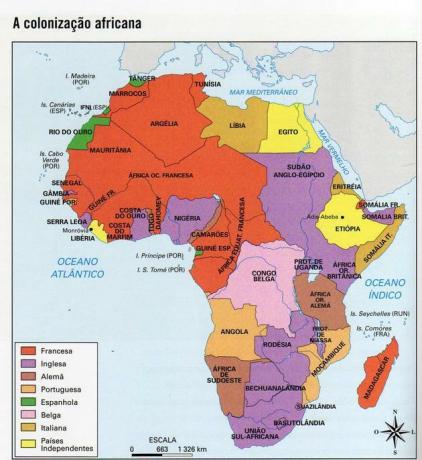THE Berlin Conference, proposed by German Chancellor Otto von Bismarck (1815-1898), was a meeting between countries to divide the African continent.
The imperialist nations of the 19th century were present: United States, Russia, Great Britain, Denmark, Portugal, Spain, France, Belgium, Holland, Italy, German Empire, Sweden, Norway, Austro-Hungarian Empire and Empire Ottoman-Turkish.
Note that some participating countries did not have colonies in Africa, such as the German Empire, the Turkish-Ottoman Empire and the United States. However, each had an interest in obtaining a piece of African territory or guaranteeing trade treaties.
Causes of the Berlin Conference

The Berlin Conference was held between November 1884 and February 1885 in Germany. Chaired by the Chancellor of the German Empire Otto von Bismarck, the event lasted three months and all negotiations were secret, as was customary in those times.
Officially, the meeting would serve to ensure free movement and trade in the Congo basin and the Niger River; and the commitment to fight for the end of slavery on the continent.
However, the idea was to resolve conflicts that were arising between some countries over the African possessions and to amicably divide the conquered territories between the world powers.
Everyone was interested in acquiring most of the territories, as Africa is a continent rich in raw materials.
Although the goals were achieved, the Berlin Conference generated several frictions among the participating countries. Let's look at some of them:
Belgium
King Leopold II chose for himself an isolated and inaccessible territory in the center of the continent. His intention was to own a colony just like his European peers, to inscribe Belgium as an imperialist nation, like England and France.
In this way, the Belgian Congo bordered several colonies of other nations and this would generate conflicts in the future.
France x England
France vied with England for colonial supremacy in both Africa and Asia. So the two nations struggled to plant their stakes in as much territory as possible on the African continent.
England relied on its powerful naval fleet, the largest at the time, to pressure and influence the outcome of the negotiations.
For its part, France was negotiating treaties with tribal chiefs throughout the nineteenth century and used this argument to secure territories on the African continent.
This technique was used by all the nations that occupied Africa. Europeans allied with certain tribes and helped them to fight their enemies by promoting wars.
Consequences of the Berlin Conference
As a result, the African territory was divided among the member countries of the Berlin Conference:

- Great Britain: its colonies crossed the entire continent and occupied lands from the north with Egypt to the south with South Africa;
- France: basically occupied North Africa, the west coast and islands in the Indian Ocean,
- Portugal: maintained its colonies such as Cape Verde, São Tomé and Príncipe, Guinea, and the regions of Angola and Mozambique;
- Spain: continued with its colonies in North Africa and on the West African coast;
- Germany: gained territory on the Atlantic coast, present-day Cameroon and Namibia, and on the Indian coast, Tanzania;
- Italy: invaded Somalia and Eriteia. Tried to settle in Ethiopia, but was defeated;
- Belgium: occupied the center of the continent, in the area corresponding to Congo and Rwanda.
In turn, commercial freedom in the Congo basin and the Niger River was guaranteed; as well as the prohibition of slavery and human trafficking
The Berlin Conference was Chancellor Bismarck's diplomatic victory. With the meeting, he demonstrated that the German Empire could no longer be ignored and was as important as the UK and France.
Likewise, he did not resolve the border disputes disputed by imperialist powers in Africa and would lead to First World War (1914-1918).
The conflict was fought between two large blocks: Germany, Austria and Italy (formed the Triple Alliance), and France, England and Russia (formed the Triple Entente).
As Africa was considered an extension of these European countries, the continent was also involved in the Great World War, with the natives joining the national armies.
This new configuration of the African continent made by the world powers, remained until the end of the Second World War (1939-1945). After this date several independence movements erupted in several African countries.
Read more:
- General Aspects of Africa
- African countries
- precolonial Africa
- Decolonization of Africa
